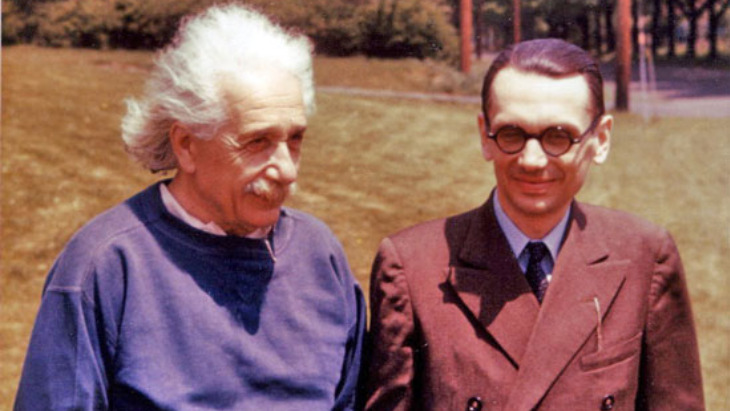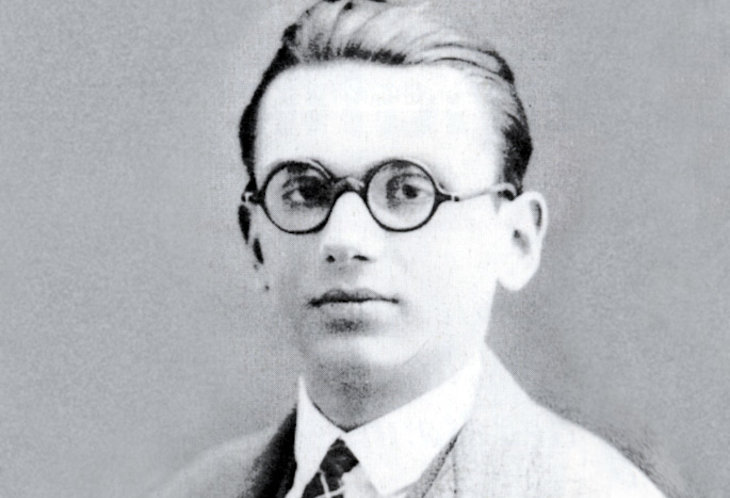 Iran’s Attack on Israel
Iran’s Attack on Israel


7 min read
That time a math genius proved God and you never heard about it.
Albert Einstein would often remark that he went to his office at Princeton's Institute for Advanced Study "just to have the privilege of walking home with Kurt Gödel." A good friend of Einstein, Gödel was the most brilliant and influential mathematician and logician of the 20th century. A master of proofs who ran non-Euclidean circles around the most brilliant minds of his day, Gödel devastated philosophical paradigms with the theorems he developed, and he laid bare long-held assumptions and cherished axioms as fundamentally unprovable. Gödel also mathematically demonstrated something that many thought was beyond the purview of proof—namely, the existence of God.
Once upon a time, two of the 20th century's most influential mathematical minds, Bertrand Russell and Alfred N. Whitehead, attempted to prove that 1+1=2. Their Principia Mathematica, the 20th century's most ambitious work of mathematics, endeavored to describe a set of axioms and inference rules in symbolic logic from which all mathematical truths could, in principle, be proven. After 378 pages, they were able to talk about how one could prove that 1+1=2, but they couldn't actually do it because they hadn't managed to define "addition" in a logically consistent way.
Around the same time, mathematician David Hilbert wanted to develop a logical system that included all correct mathematical reasoning for any particular mathematical area and to prove that it contained no contradictions. In response, Gödel published a series of papers showing why Russell, Whitehead, and Hilbert's quests for mathematical completeness were doomed to fail. Gödel proved definitively that neither the Principia Mathematica (nor any other attempt) could ever prove 1+1=2 in an internally consistent, logical way. In his incompleteness theorems, Gödel showed that mathematics alone could not establish the logical consistency of mathematics through mathematical proofs. Because one always has to make unprovable assumptions about one's fundamental axioms, all mathematical systems are incomplete, and every mathematical system will have some statements that can never be proven.
Using mathematics that revolutionized the world of logic and science, Gödel showed that there is more to truth than can be captured by proof.
Gödel's incompleteness theorems show that if a formal system is 1. finitely specified, 2. large enough to include arithmetic, and 3. consistent, then it is incomplete. His groundbreaking logical demonstration—that all mathematical systems have limits—was a lesson in humility to the "Logical Positivists" of Gödel's day, who asserted that scientific and mathematical investigations of the universe could discover all truths and have no limits. Gödel showed that if science is based on mathematics, and mathematics cannot discover all truths, then science, in principle, cannot discover all truths. Using mathematics that revolutionized the world of logic and science, Gödel showed that there is more to truth than can be captured by proof.
Having demonstrated the incompleteness of all mathematical systems, Gödel also sought to show that the universe would be incomplete and inconsistent without an afterlife and a creator God. Gödel reasoned:
For it is by no means chaotic or random, but, as science shows, everything is permeated by remarkable regularity and order. Order is a form of rationality.
If the world is rationally constructed and has meaning, then there must be such a thing as an afterlife. For what sense would there be in creating a being (man), which has such a vast realm of possibilities for its own development and for relationships with others, and then not allowing it to realize even a thousandth of those possibilities? That would be almost like someone laying, with the greatest effort and expense, the foundations for a house and then letting it all go to seed again.
 phys.org
phys.org
But does one have reason to suppose that the world is rationally constructed? I believe so. For it is by no means chaotic or random, but, as science shows, everything is permeated by remarkable regularity and order. Order is a form of rationality.
How would one envision a second or another life? About that, there are naturally only guesses. However, it is interesting that it is precisely modern science that provides support for such a thing. For it shows that this world of ours, with all the stars and planets in it, had a beginning and most probably will also have an end (that is, it will literally come to "nothing"). But why, then, should there exist only this one world—for just as we one day found ourselves in this world, without knowing why and wherefrom, so can the same thing be repeated in the same way in another world.
Within the context of seeking truth beyond proof, Gödel developed a mathematical argument to demonstrate the logical consistency and necessity of God's existence. Gödel's proof elaborated upon the ontological proof of Gottfried Leibniz, the founder of computer science who invented both calculus and binary code in the late 1600s. Gödel sought to fix the fundamental weaknesses of and remove inconsistencies from Leibniz's proof as well as address all of the classic philosophical criticisms of previous ontological proofs, including Immanuel Kant's well-known objection that existence should not be treated as a predicate.
The ontological proof of Gödel harnesses higher-order mathematical logic to show that the existence of God is a necessary truth. "God" in Gödel's proof is defined as a "God-like object." In order for an object to be "God-like," it must have every good or positive property. Also, a God-like object has no negative properties. In the context of Gödel's proof, an object (x) has "the God-like property" if and only if for every property (φ), if φ is a positive property, then x has property φ. Because being "God-like" is a positive property, it is possible that that property exists in an object (x). After mathematically defining essential properties, Gödel then shows that it is necessary that there is an object x that has the God-like property. If a God-like object (i.e., God) has every good property, and necessary existence is a good property, then a God-like object (i.e., God) must exist.
While Gödel privately believed in God and read the Bible every Sunday, fear of ridicule from his academic peers made him reluctant to present his ontological proof publicly. Gödel thus never published his proof for the existence of God and only passed it on to a colleague and friend to publish because he believed he was going to die.
For many years Gödel's work was inaccessible and difficult to assess because very few could reach the levels of mathematical, philosophical, and logical sophistication required even to understand it—let alone to evaluate it for logical and mathematical consistency. Recently, with the help of Artificial Intelligence specially designed to evaluate higher-order logic and advanced theoretical mathematics, researchers decided to put Gödel's ontological proof for the existence of God to the test.
Demonstrating the consistency of Gödel's ontological proof, AI researchers concluded that "from Gödel's premises, the computer proved: necessarily, there exists God" and also that "this God-like entity is unique, i.e., monotheism is a consequence of Gödel's theory." The AI also showed that "prominent objections to his proof…are currently not on a par with Gödel's work…with respect to technical precision and persuasive power." From this research, it is clear that Gödel's ontological argument succeeds in that "it shows that Belief in a (God-like) supreme being is not trivially irrational. There are consistent axiomatizations that non-trivially entail the necessary existence of a God-like being."
Yet the results of such AI calculations about metaphysics still rely on fundamental assumptions regarding the mathematical axioms that one chooses in the first place. As the AI researchers reflect, "as for any axiomatization…it remains a 'matter of faith to believe in the truth of the proposed axioms in the actual universe." This, of course, would come as no surprise to Gödel—as it was he, after all, who conclusively demonstrated to the world that all mathematical and scientific endeavors are ultimately unprovable and that such endeavors always require a leap of faith to get off the metaphysical ground.
For more content like this, please visit www.beyondbelief.blog
